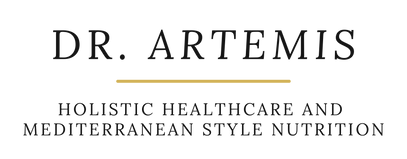.png)
Ancient Wisdom, Modern Healing—In Your Hands.
Begin Your Wellness Journey
Learn More with Dr. Artemis Morris

As Seen on TV
Watch the Videos Below
Natural Skin Care that Works
What’s Getting In the Way of Your Weight Loss?
The Mediterranean Detox Program Solution
Back to School Vitamins to Keep Our Children Healthy
Are Supplements Worth It?
Ways to Treat Adrenal Fatigue
Learn More with Dr. Artemis Morris

Publications
Read them now >
Phytoestrogens and Women's Health

Exploring the benefits of phytoestrogens in managing menopause symptoms and reducing breast cancer risks.
This article examines the role of phytoestrogens, particularly soy, in managing menopausal symptoms and supporting breast cancer prevention. It discusses the scientific evidence behind these plant-derived compounds and their impact on women’s health.
The Vaginal Microbiome
Infertility, defined as the inability to conceive after 1 year of unprotected sex, is a growing problem affecting 1 million married premenopausal women, according to the Centers for Disease Control and Prevention (CDC).1 An estimated 7.5 million women aged 15-44 years have impaired fertility and fecundity.1 It is well established that the maternal microbiome influences the risk of chronic diseases and mood disorders in the neonate and throughout life, starting in utero.2 But to what extent does the microbiota of the vaginal tract influence a woman’s ability to conceive and carry an infant to term?

Mediterranean Diet and Lifestyle

Ethnographic Case Study for Eugeria, Health, and Longevity
It is well known that the Mediterranean area is home to a large percentage of people who are not only surviving to but thriving into their 80s and beyond. According to a review article, “Islands in the Mediterranean basin share particular habits and traditions and greater life expectancy than other European regions.”1 Dan Buettner, author of The Blue Zones: Lessons for Living Longer From the People Who’ve Lived the Longest (National Geographic), studied geographical areas of people living into their 80s and older.
Menstruation, the Moon and Empowerment through Choice
Every 21-to 35 days women bleed for 2-7 days in order to biologically bear children in a grand sacrifice of their body to perpetuate the human race. What does our period (aka menses) mean to us? How do we prepare for and manage this integral part of our nature? What influences “it’- does the moon? other women? How do we deal with and treat menstrual diseases? These are questions that can not be answered in one paper, however, they are worth a lively discussion that is long overdue to reclaim the “cur-sed” parts of ourselves that happen to make us uniquely female.


.png)
